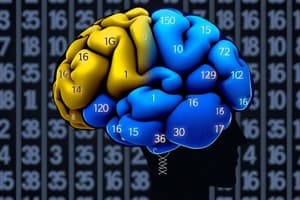Podcast
Questions and Answers
Which of the following is a benefit of computerized adaptive testing?
Which of the following is a benefit of computerized adaptive testing?
- It does not require reading comprehension
- It is more accurate than manual scoring (correct)
- It is less expensive than group testing
- It can capture nonverbal and emotional behaviors
What is a limitation of group testing, regardless of whether it is done face-to-face or using a computer?
What is a limitation of group testing, regardless of whether it is done face-to-face or using a computer?
- It misses nonverbal and emotional behaviors (correct)
- It is not customizable to individual abilities
- It is more expensive than individual testing
- It is less accurate than individual testing
What percentage of the population is still hesitant to use computers for testing?
What percentage of the population is still hesitant to use computers for testing?
- 10%
- 40%
- 30%
- 20% (correct)
What is the positive manifold model of intelligence?
What is the positive manifold model of intelligence?
What is the factors model of intelligence?
What is the factors model of intelligence?
What are the three types of intelligence mentioned in the text?
What are the three types of intelligence mentioned in the text?
What factors are important to consider when assessing a person's cognitive function?
What factors are important to consider when assessing a person's cognitive function?
What is the correlation between biological family background and cognitive function?
What is the correlation between biological family background and cognitive function?
What is the correlation between the amount of schooling completed and adult IQ?
What is the correlation between the amount of schooling completed and adult IQ?
What is the correlation between psychosocial factors and cognitive growth?
What is the correlation between psychosocial factors and cognitive growth?
What is the Stratum III of Carroll's Three-Stratum Theory?
What is the Stratum III of Carroll's Three-Stratum Theory?
Which cognitive abilities are believed to be largely genetically determined according to Carroll's Three-Stratum Theory?
Which cognitive abilities are believed to be largely genetically determined according to Carroll's Three-Stratum Theory?
Which cognitive abilities are believed to be largely influenced by environmental factors according to Carroll's Three-Stratum Theory?
Which cognitive abilities are believed to be largely influenced by environmental factors according to Carroll's Three-Stratum Theory?
What is the purpose of IQ testing?
What is the purpose of IQ testing?
What are some limitations of group IQ testing?
What are some limitations of group IQ testing?
What is the benefit of multilevel and adaptive computer testing?
What is the benefit of multilevel and adaptive computer testing?
What ethical concerns should be considered when using computerized testing?
What ethical concerns should be considered when using computerized testing?
What is the difference between monozygotic and dizygotic twins in the context of intelligence research?
What is the difference between monozygotic and dizygotic twins in the context of intelligence research?
What is the speaker's stance on the nature vs nurture debate in intelligence research?
What is the speaker's stance on the nature vs nurture debate in intelligence research?
What is the importance of creating the best possible environment according to the speaker?
What is the importance of creating the best possible environment according to the speaker?
What is the main difference between Spearman's G model and Guilford's model of intelligence?
What is the main difference between Spearman's G model and Guilford's model of intelligence?
What is the significance of Spearman's G factor in the study of intelligence?
What is the significance of Spearman's G factor in the study of intelligence?
What is factor analysis and how is it related to Spearman's G model?
What is factor analysis and how is it related to Spearman's G model?
What is the main criticism of Spearman's G model of intelligence?
What is the main criticism of Spearman's G model of intelligence?
Flashcards are hidden until you start studying
Study Notes
Benefits and Limitations of Computerized Adaptive Testing
- A benefit of computerized adaptive testing is that it can tailor the difficulty of questions to the individual's ability level.
Limitations of Group Testing
- A limitation of group testing, regardless of whether it is done face-to-face or using a computer, is that it assumes all test-takers have the same abilities and knowledge.
Computer Anxiety and Testing
- Around 10-20% of the population is still hesitant to use computers for testing.
Models of Intelligence
- The Positive Manifold Model of intelligence suggests that cognitive abilities are positively correlated and form a general intelligence factor.
- The Factors Model of intelligence proposes that there are multiple cognitive abilities that are distinct but correlated.
Types of Intelligence
- The three types of intelligence mentioned are verbal, spatial, and mathematical intelligence.
Assessing Cognitive Function
- When assessing a person's cognitive function, factors such as age, education, and cultural background are important to consider.
Correlations with Cognitive Function
- There is a correlation between biological family background and cognitive function.
- There is a correlation between the amount of schooling completed and adult IQ.
- There is a correlation between psychosocial factors and cognitive growth.
Carroll's Three-Stratum Theory
- Stratum III of Carroll's Three-Stratum Theory includes narrow, specific abilities.
- According to Carroll's theory, fluid intelligence and crystallized intelligence are largely genetically determined.
- According to Carroll's theory, narrow, specific abilities are largely influenced by environmental factors.
Purpose and Limitations of IQ Testing
- The purpose of IQ testing is to measure cognitive abilities and predict academic success.
- A limitation of group IQ testing is that it may not account for individual differences.
Multilevel and Adaptive Computer Testing
- The benefit of multilevel and adaptive computer testing is that it can accommodate different ability levels and learning rates.
Ethical Concerns of Computerized Testing
- Ethical concerns of computerized testing include ensuring equal access to technology and avoiding bias in testing.
Twin Research in Intelligence
- Monozygotic twins share 100% of their genes, while dizygotic twins share 50% on average.
- The speaker suggests that the environment plays a significant role in intelligence.
Importance of Environment in Intelligence
- The speaker emphasizes the importance of creating the best possible environment to support cognitive development.
Models of Intelligence: Spearman and Guilford
- Spearman's G model proposes a general intelligence factor that influences all cognitive abilities.
- Guilford's model proposes multiple, independent cognitive abilities.
Spearman's G Factor
- Spearman's G factor represents the shared variance among cognitive abilities.
- Factor analysis is a statistical method that identifies underlying factors, such as Spearman's G factor, that explain patterns in data.
Criticism of Spearman's G Model
- A criticism of Spearman's G model is that it oversimplifies the complexities of human intelligence.
Studying That Suits You
Use AI to generate personalized quizzes and flashcards to suit your learning preferences.




